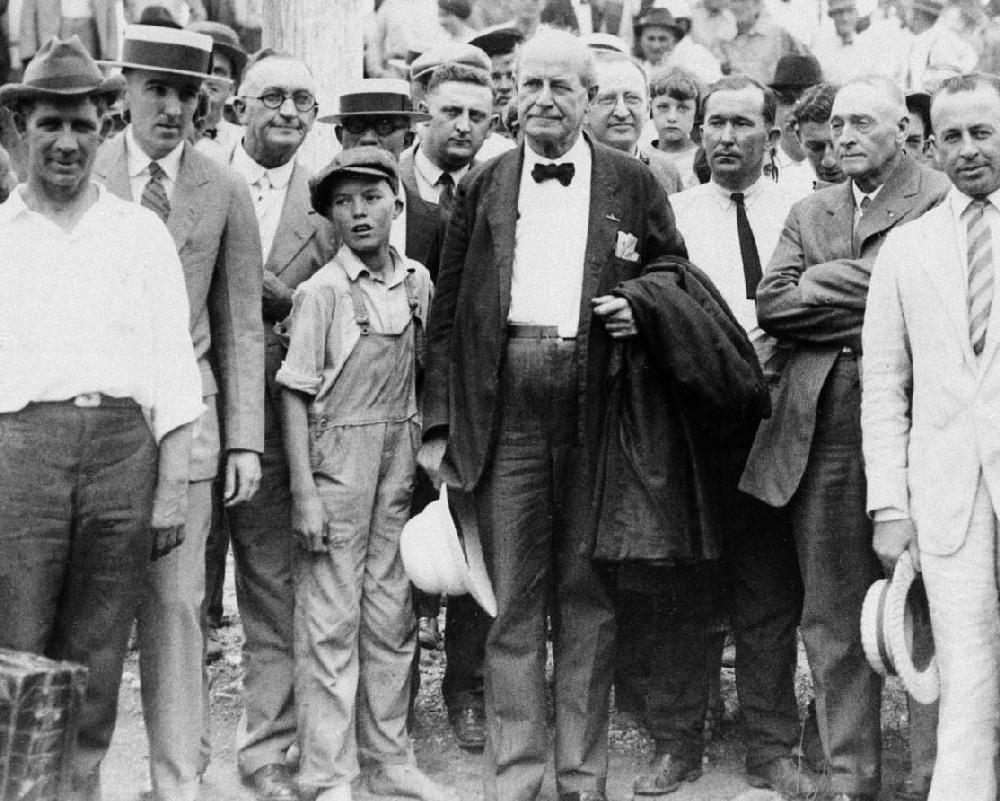
Great Trials of History: The Scopes Monkey Trial (1925)

Figure 1.--This photo shows William Jennings Bryan (1860-1925) arriving at Dayton, Tennessee. He was there to support the prosecution in the trial against John Thomas Scopes (1900-1970), accused of having taught evoluztion in a public school, agasinst the law in Tennessee. The verbal battle between Bryan and famned defense attorney Claren Dasrrow is one of the great events in American jurisprudence. The result was that contrary to what the procecution, judge, and governor wanted, the Tennessee law went on trial rather than John Scopes. Bryan was humiliated and died a few days after the conclusion of the trial.
|
|
The Scoppes Monky Trial is another of the trials with which most people are familiar. The Tennesse Legislature passed a law making it a misdemeanor punishable by fine to 'teach any theory that denies the story of the Divine Creation of man as taught in the Bible, and to teach instead that man has descended from a lower order of animals'. A young biology teacher, John Thomas Scopes, in Dayton, Tennessee, openly violated the new law and was arrested. He was supported by local businessman George Rappalyea. They appealed to the American Civil Liberties Union (ACLU) to organize a defense. These were the days when the ACLU was really interested in civil liberties. They arranged for famed defense asttorney Clarence Darrow to lead the defense. The court case was dubbed by the press as the 'Monkey Trial'. The trial had already begun to attract national attention when, William Jennings Bryan, the three-time failed Democratic presidential candidate and a Christian fundamentalist hero and perhaspsthe most notedorastor in the country, volunteered to assist the prosecution. The trial pitted two of the most famous people in America on perhapsthe most controversial question of the day. The result was a media frenzy and one of the most celebrated trials in U.S. history. Hordes of fired up mostly local spectators supporting tyhe prosecution and big-city reporters supporting Scopes descended on Dayton. The small town had never seen anything like it. The town became a kind of carnival. Exhibits were opened featuring two chimpanzees and a reputed living 'missing link'. Stands selling Bibles, toy monkeys, hot dogs, and ice cold lemonade opened aroundthe court house. Fundmentalist preachers set up revival tents along the city’s main street to keep the faithful stirred up. The trial opened (July 10) in the middle of the southern summer in the days before air conditioning. While there was no air conditioning, there was radio, And the trial was not only covered by the print media, but the public followsed it all on natiional radio brodcast-- the first such national sensation to be covered by radio.
The court house was packed and sweltering. Judge Raulston ordered the trial moved to the courthouse lawn, not only becauseofthe heat, but becuse he was afraid that the weight of the crowd inside might collapse the floor.
The Judge undercut Darrow's defense strategy when he ruled that expert scientific testimony on evolution was inadmissible. It was Scopes who was on trial, not evolution ir the law he had violated. Darrow in turn called Bryan himself to testify. The prosecution was not happy with this, but Bryan ever the crusading Christian soldier rose to the challenge. It was then that the sparks began to fly.
As it played out, evolution or more correctly religious attempts to question science rather than John Scopes went on trial despite the Judge's and prosecution's best efforts. Unfortunately, popular perception are based almost solely on 'Inherit the inf', both the Broadway and movie version. It is true thast Bryan's oposition to Darwin was relgious in character. It was, however, not the only reason. Bryan was concerned
abiout publicworals, war, and the growing eugenics movement. That istoo often ignored.
CIH

Navigate the Children in History Website:
[Return to the Main trial page}
[Return to the Main law history page]
[About Us]
[Introduction]
[Biographies]
[Chronology]
[Climatology]
[Clothing]
[Disease and Health]
[Economics]
[Freedom]
[Geography]
[History]
[Human Nature]
[Law]
[Nationalism]
[Presidents]
[Religion]
[Royalty]
[Science]
[Social Class]
[Bibliographies]
[Contributions]
[FAQs]
[Glossaries]
[Images]
[Links]
[Registration]
[Tools]
[Children in History Home]
Created: 2:34 AM 2/3/2019
Last updated: 4:31 AM 2/3/2019



